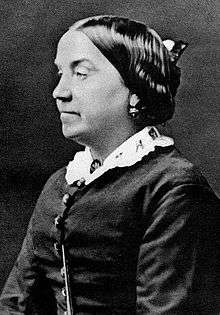Lizzie Burns
| Lizzie Burns | |
|---|---|
 Lizzie Burns 1877 Photograph by William Hall, Brighton | |
| Born |
1827 Manchester |
| Died |
1878 (aged 51) London |
| Other names | Lydia Burns |
| Occupation | British activist |
Lydia "Lizzie" Burns (6 August 1827[1] – 12 September 1878 in London) was a working-class Irish woman, best known as a long-term partner of Friedrich Engels.[2][3]
Lizzie Burns was a daughter of Michael Burns or Byrne, a dyer in a cotton mill, and of Mary Conroy. The family may have lived off Deansgate.[4] Her mother died in 1835, and her father remarried a year later.[5]
Lizzie had an elder sister Mary (1821–1863), a lifelong partner of Engels until her sudden death of a heart disease. Mary Burns and Engels considered marriage a bourgeois institution and never married. In the 1850s, when Mary Burns and Engels lived in Ardwick, Lizzie stayed with them as a housekeeper, and after her sister's death eventually became Engels' partner. In the 1870s they lived openly as a couple in London, with Lizzie's niece, Mary Ellen (known as Pumps), as a housekeeper.[5][6]
Both Lizzie and her sister were known as formally illiterate yet intelligent women, with strong working-class ties.[7] They showed Engels the actual conditions of the factory employers in Britain.[5] Eleanor Marx wrote that[8]
[Lizzie] was illiterate and could not read or write but she was true, honest and in some ways as fine-souled a woman as you could meet.
In early September 1878 Burns fell seriously ill with some kind of tumor,[5] and to please her religious beliefs, Engels married her.[7] She died hours later. Her death made a strong impression on Engels. He later wrote about her:[2]
My wife was a real child of the Irish proletariat and her passionate devotion to the class in which she was born was worth much more to me – and helped me more in times of stress – than all the elegance of an educated, artistic middle-class bluestocking.
References
- ↑ Roy Whitfield: Friedrich Engels in Manchester. The Search for a Shadow, S. 86
- 1 2 Henderson, William Otto (1976). The Life of Friedrich Engels. Psychology Press. p. 567. ISBN 978-0-7146-3040-3.
- ↑ Samuel Hollander (2011). Friedrich Engels and Marxian Political Economy. Cambridge University Press. p. 358. ISBN 978-1-139-49844-9.
- ↑ Whitfield, Roy (1988) Friedrich Engels in Manchester, Working Class Movement Library, ISBN 0906932211
- 1 2 3 4 Dash, Mike (1 August 2013) How Friedrich Engels’ radical lover Mary Burns helped him father socialism. Smithsonian Magazine
- ↑ Jones, Gareth Stedman (2004) "Engels, Friedrich (1820–1895)" in Oxford Dictionary of National Biography, Oxford University Press.
- 1 2 Green, John (7 May 2009) Friedrich Engels was not a hypocrite. The Guardian
- ↑ Irving, Sarah (15 March 2010) Frederick Engels and Mary and Lizzy Burns. wordpress.com